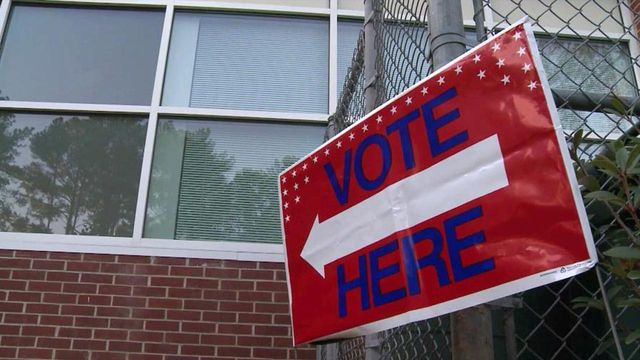House OKs voter ID rules
Legislation setting the rules for the recently approved constitutional amendment requiring voters to show photo identification at the polls is one vote away from passage after the House approved the measure Wednesday.
Posted — UpdatedUnder the proposal, the following IDs would be acceptable at the polls:
- A North Carolina driver's license
- Identification cards for non-drivers issued by the state Division of Motor Vehicles
- U.S. passports
- A county-issued voter ID card
- A tribal enrollment card issued by a federally or state-recognized tribe.
- A student ID card from a University of North Carolina school, a community college or a private university
- An employee identification card issued by a state or local government entity, including a charter school
- A driver's license or ID card issued by another state if the voter's registration came within 90 days of the election
All of those types of ID must be valid and either unexpired or expired for less than a year. Officials at universities, colleges and local government entities would be required to certify every four years that their processes for printing IDs are secure and that they have verified the age and citizenship status of ID holders.
The bill also allows the following forms of ID regardless of whether they carry expiration or issuance dates:
- A military ID issued by the U.S. government
- A veteran's identification card issued by the U.S. Department of Veterans Affairs
- Any of the allowed IDs, even if they're expired, if the voter is at least 65 years old, as long as the ID was unexpired on his or her 65th birthday.
"One person, one vote [is] not protected here," Jordan said. "The breathtakingly wide array of entities allowed to issue a statutorily valid photo identification document means that this bill is not [election] security, in my opinion."
Some lawmakers tried to eliminate student IDs from the accepted list, insisting that they are easy to fake. Rep. Michael Speciale, R-Craven, even held up what he said was a fake ID from Wake Technical Community College that he was able to order online.
"These cards are easy to get, and I think it's defeating the purpose, the whole purpose, of voter ID," Speciale said.
On the other side of the aisle, Democrats disputed the need for a voter ID law at all, saying it would unnecessarily prevent some poor, minority and elderly people from voting.
"If we have to go back to the streets again to get an impediment-free right to vote, I'll spend the rest of my life doing it," said Rep. Mickey Michaux, D-Durham, a veteran of the civil rights movement.
"I'm sure it is slightly embarrassing to the majority that talks constantly about preventing voter fraud that an election may have been stolen in southeastern North Carolina by their operatives, and it's a shame that we're not willing to stand up and address that," Jackson said.
The proposal does call for absentee voters to eventually be required to send a photocopy of the ID along with their ballot.
"We do need to get a handle on voting by mail," agreed Rep. David Lewis, R-Harnett, who called the 9th District investigation an embarrassment.
The legislation is "an important first step to making sure problems like that do not occur again," he added.
House Speaker Tim Moore took the rare step of coming down from the dais to debate the bill on the floor and recognized the often personal tone the voter ID debate has taken on over the years.
"You'll hear one side yell, 'Voter suppression.' You'll hear one side yell, 'You want to encourage voter fraud,'" Moore said. "This is an issue where folks need to put all that down [and] come together – come to an agreement for something that, I believe, with this legislation, is a very fair resolution."
Moore was criticized later for holding a final vote on the bill before Democrats could object.
The bill allows three exceptions to the photo ID requirement: a religious objection to have a photo taken, a natural disaster that occurs with 100 days of an election or a reasonable impediment to obtaining an ID.
A "reasonable impediment" includes a lost or stolen ID or a disability or family or work responsibilities that make getting an ID difficult. For elections in 2019, not knowing the new ID requirement also would be accepted as a reasonable impediment.
Anyone meeting one of the three exceptions would be allowed to vote a provisional ballot after signing an affidavit under penalty of perjury that he or she is the person allowed to vote who appeared at the polling place and stating the reason for not having a photo ID. County elections officials would then decide whether to count each provisional ballot.
Related Topics
• Credits
Copyright 2024 by Capitol Broadcasting Company. All rights reserved. This material may not be published, broadcast, rewritten or redistributed.






